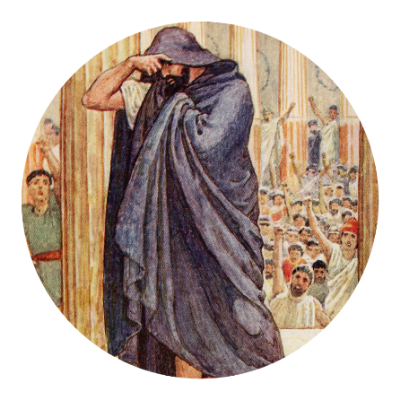I’m looking to get inspiration for my own writing. I need a hard sci fi series where earth (and earthlike worlds) are too rare, inaccessible, and/or previously spoiled beyond ability to sustain life. Bonus points if it is set on a multi-generational space station or starship without any other options and goes into detail about life support, living space, mineral mining and expansion of the station to accomodate a growing population, and daily life of it’s residents.
If anyone remembers Drifter Colonies from Titan A.E., that’s what’s in my head.
I’m looking for The Martian levels of realism, and I’m fine with a bit of “Unobtanium” clichés if they’re not core to the story.
Ohhhhh boy, I get to nerd out. OK, super short story; reading and chatting about The Expanse book series got me pointed towards the work of Alastair Reynolds. The early parts of his universes arch aren’t really relevant for your purposes, but in the latter books, how humanity survives on lifeless rocks, is exactly what you’re looking for. Plus, he’s a astrophysicist doctor, iirc, and it is quite quite good hard Sci Fi.
I finished Alastair Reynold’s Pushing Ice a few months ago and it’s kind of close to what OP is looking for. Also a really good book!
I love Alastair Reynolds
Seveneves by Neal Stephenson is this.
Also Tau Zero by Poul Anderson, to a degree.
Came here to say Seveneves as well. Just borrowed it again from the library today actually! Highly recommend.
Just chiming in to say Seveneves is a great read.
I was going to suggest Tau Zero. It might not be exactly what he’s chasing but there’s are some similar points. Plus it’s really good and fairly short.
It certainly ticks off the hard science point, but is more about how the crew deal with everything philosophically. Nothing like the Martian I guess.
Just a loose round up so far
Seveneves Neal Stephenson
Tau Zero Poul Anderson
Metro 2033 Dmitry Glukhovsky
The Children of Time Adrian Tchaikovsky
Lucifer’s Hammer Larry Niven
Pushing Ice Alastair Reynolds
Record of a Spaceborn Few by Becky Chambers
Diaspora by Greg Egan
A Memory Called Empire by Arkady Martin
The 100 Kass Morgan
Interdependency trilogy by John Scalzi.
Silo series of books by Hugh HoweySeveneves is incredible, with the caveat that the last chapter of the book was almost handwavey with regards to the author’s conclusion of where humanity ended up. 10/10 otherwise.
What’s the rest of his works like? I’ve read snow crash and loved it, will give seveneves a go.
Highly recommend Anathem and Diamond Age. Cryptonomicon and Baroque Cycle are more tours-de-force but if you are nerdy enough (I mean c’mon this applies to all his work) and very into history, I can recommend those too.
Seconded!
I wouldn’t call Cryptonomicon a tour de force, I remember it fondly. But then again, I’m mildly interested in cryptography and historical background to stuff never hurts when presented entertainingly 😀
If you liked Snow Crash, give Diamond Age a try.
The only other one I’ve attempted to read by Niel Stephenson has been Cryptonomicon. It seemed to get way, way into the weeds and is over a thousand pages. It was in my 20’s that I attempted it and I only made it half way through.
His work is top tier and highly regarded by many as thoroughly researched.
That last part felt like an entirely different book. I didn’t even finish it. I just pretend the story ended before that.
Thumbs up for the Silo series. Even though it’s not in outer space, many other boxes tick: multi-generation, environmental systems, spoiled planet …
Going to have to check this one out!
I’ve loved half of that list and now have to read the other half
The Children of Time books by Adrian Tchaikovsky have a lot of those themes. Half of the first book is about an ark ship sent out to find a habitable planet because earth is dying. It spans hundreds of years as key crew members go in and out of hyper sleep. Relationships and political factions form and dissolve as the ageing ship continues its mission to find a new home.
The second book focuses on a terraforming crew that was sent to another star system to prepare a planet for humans. However, the planet’s ecology is so alien it proves very difficult to gain a foothold.
I’ll second this (though I’ve only read the first thus far). I don’t know that I’d consider it especially hard SciFi but it’s far from a space opera. I recall feeling like the justification for the creation of the arachnid race was a bit hand-wavey, but the level of thought put into their society more than made up for the required suspension of disbelief. Definitely one of my favorite books.
For something similar I’d also recommend Dragon’s Egg by Robert L. Forward. It’s about the discovery of intelligent life on a neutron star, who develop at a rate exponentially faster than humanity. Also not super hard SciFi, but a great exploration into truly alien life.
I really enjoyed the first and could not get into the second in the children of time series
There’s a third now, I need to read it still. I liked the second, though
It’s possible Just wasn’t the flavor I was looking for at the time. I’ll give another go at some point. I hear great things from people so it’s probably just send me a thing
I loved the first two, but I had a hard time getting through the third. It has interesting concepts but it takes a long time to make its point. Plot structure spoilers:
Spoiler
The main reveal should have happened half way through, not at the end.
Apologies for mobile formatting
The Expanse series is kinda like that. There are other planets, but most of the action takes place on ships, stations, and asteroids that have been converted into stations. It goes into depth about life in space, and everything from engineering to biology, sociology, politics, and theology.
The topic is straight brought up several times, including most notably in book 2 about the Jupiter moons, but they all claim it’s borderline impossible because all this is super delicate system only made possible by Earth anyway. Which is later proven true in last book.
The Bobiverse series is about a person who dies and wakes up as an AI that must replicate itself across the stars, while humanity ends on Earth.
Read Dune if you didn’t read it it goes deep in to ecology and terraforming of Arrakis, Fremen surviving on it,water relations in environment…
Another inspiration for you may be Scavengers Reign - animated series about surviving on lush planet that is really inhospitable for humans.
Dune is a fantastic series!
The Interdependency series by John Scalzi portrays a society where some number of star systems, containing only one habitable planet which is at the very far reaches of the wormhole network, are connected together by wormholes. The society is called “the Interdependency” because every orbital habitat, dome and underground city is hugely dependent on trade with other habitats… without robust transfer of goods and raw materials EVERYONE would die… and this DOESN’T prevent stupid, short sighted, greedy humans from gambling with the stability of it all for their own personal economic and political gain. Fun books. Like most Scalzi, it’s not too deep. But it’s lots of fun.
Can vouch for that series. Great fun.
That’s what immediately came to my mind!
Doesn’t quite fit the bill as there’s a planet eventually but Children of Time by Tchaikovsky is excellent and half the book follows a generation ship. The other half follows a successive evolution of uplifted spiders. It’s reasonably hard sci-fi not Martian levels of detail about the science but very well written and enjoyable. Could be worth a go for some inspiration.
The other half follows a successive evolution of uplifted spiders
This is the book I didn’t know I wanted to read until now.
It does a really good job of making you empathize with giant spiders. I can also recommend the audio book, very well done.
@Berttheduck awesome. I love relatable non-human characters that are genuinely alien not just crypto humans.
It owns. Haven’t read the third one yet. Not even sure if it’s out but if it is it’s next on the list.
@Lemonparty cool I’ve been looking for a series.
If you also accept TV series, Battlestar Galactica may interest you.
It deals with a small fleet of survivors desperately seeking a new home planet, who live in constant paranoia due to the enemy being able to plant sleeper agents within their crews. I remember they had to mine asteroids for fuel.
Children of Time series goes over this a little bit, especially in the first book. Colonists end up waking up early due to a malfunction and end up falling into a devolving tribalistic race to the bottom on their journey to the planet.
EDIT: As for “hard” scifi, while I wouldn’t say this series is at the same level as The Martian or maybe The Expanse, it is pretty good with trying to keep things real, especially with regards to the human threads of the story.
https://bookshop.org/p/books/children-of-time-adrian-tchaikovsky/113411?ean=9780316452502
Author and book information. Good series.
Not quite what you’re after but I absolutely love Diaspora by Greg Egan.
It’s a different take on the same issues you’re asking about (not at first, but it’s not really a spoiler to say that it explores them whether or not it’s as necessary as your examples state), a take that leans more into different forms of existence rather than supporting our current existence in a different environment (but touches on aspects of that too, kind of). It’s mega-multi-generational while also not being that at all, depending on perspective.
Not quite what you’re after but I absolutely love Diaspora by Greg Egan.
Came here to say that it’s the BOOK OP is looking for , Moreover, it’s one of the authors present on the fediverse @gregeganSF@mathstodon.xyz
I don’t know how the original version works, but in the French translation Francis Lustman made a real effort in building a coherent grammar with neo-pronoms which match very well the book tone, and is a great exercise.
However, Diaspora isn’t the most accessible Egan book. I mean, if you never heard about stuff like complex conjugate, or Penrose tiles you’ll struggle with some of the concept.
It was my first real Sci fi book haha. Definitely a struggle but I was hooked once I started grasping even a sense of what was going on in the conceptory at the beginning.
From there, I understood what I understood, and let the other concepts flow over me in a way. Sometimes they’d click once I was a few chapters deeper and something that was discussed earlier came into effect and I’d go back and re read, other things made more sense when I read the whole thing again years later.
Reading it, I definitely didn’t get the full intended effect that someone with more knowledge would have, but it still managed to stick with me for decades now and absolutely shaped my Sci fi tastes
Someone what mentioned Kim Stanley Robinson’s Red Mars trilogy, and that is really good, but his book Aurora is almost exactly what you are describing.
Highly recommend.
I was looking for Aurora. I also think it’s right on the money. Gets into the weeds with micro ecosystems.
The idea that humans need the diverse micro ecology of earth in order to not become ill over the course of generations is pretty interesting.
The idea that humans need the diverse micro ecology of earth in order to not become ill over the course of generations is pretty interesting.
Really pretty well-supported by current science, too. I teach chemistry at a community college, so maybe I’m an outlier, but I read a ton of current research about the importance of diversity in “gut biomes” and the damaging effects of monoculture on global ecology, etc.
It seems pretty clear that even if engineers could solve the physical and chemical issues with a generation ship, the limiting constraints are almost certainly going to be biological and ecological, and KS Robinson’s estimates for the upper limits seem pretty reasonable based on current knowledge
The Mars series by Kim Stanley Robinson definitely fits the bill. The Ministry of the Future does too but it is more about the coming climate change disaster.
Love me some KSR.
His Mars series is my sci-fi Lord of the Rings.
It’s a very non traditional story structure (at least to a western reader) but The Three Body Problem series has a lot of plot revolving around the lack of inhabitable worlds.
Wasn’t there a ship, or two, that had to escape into deep space for like, a long long time?
!yes, in fact those ships end up being very important to some big events in the last 2 books!<















